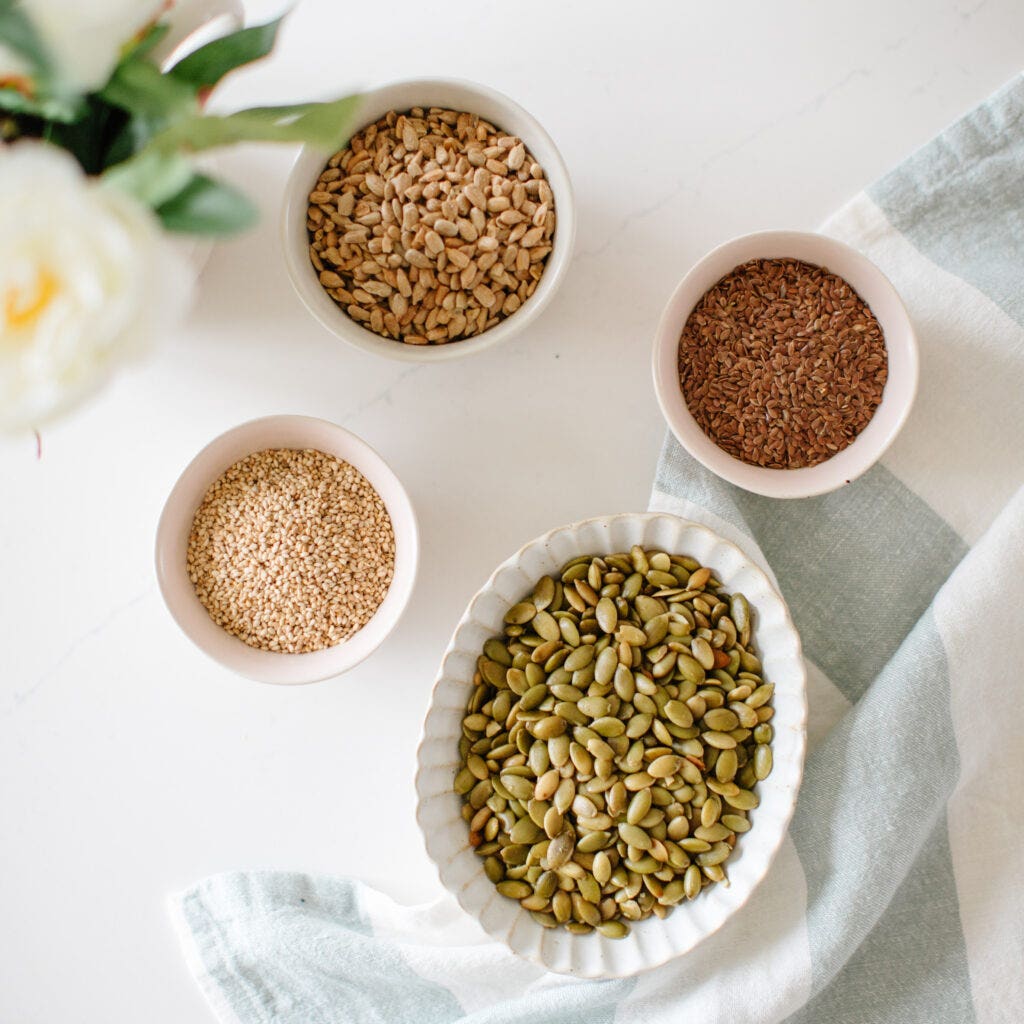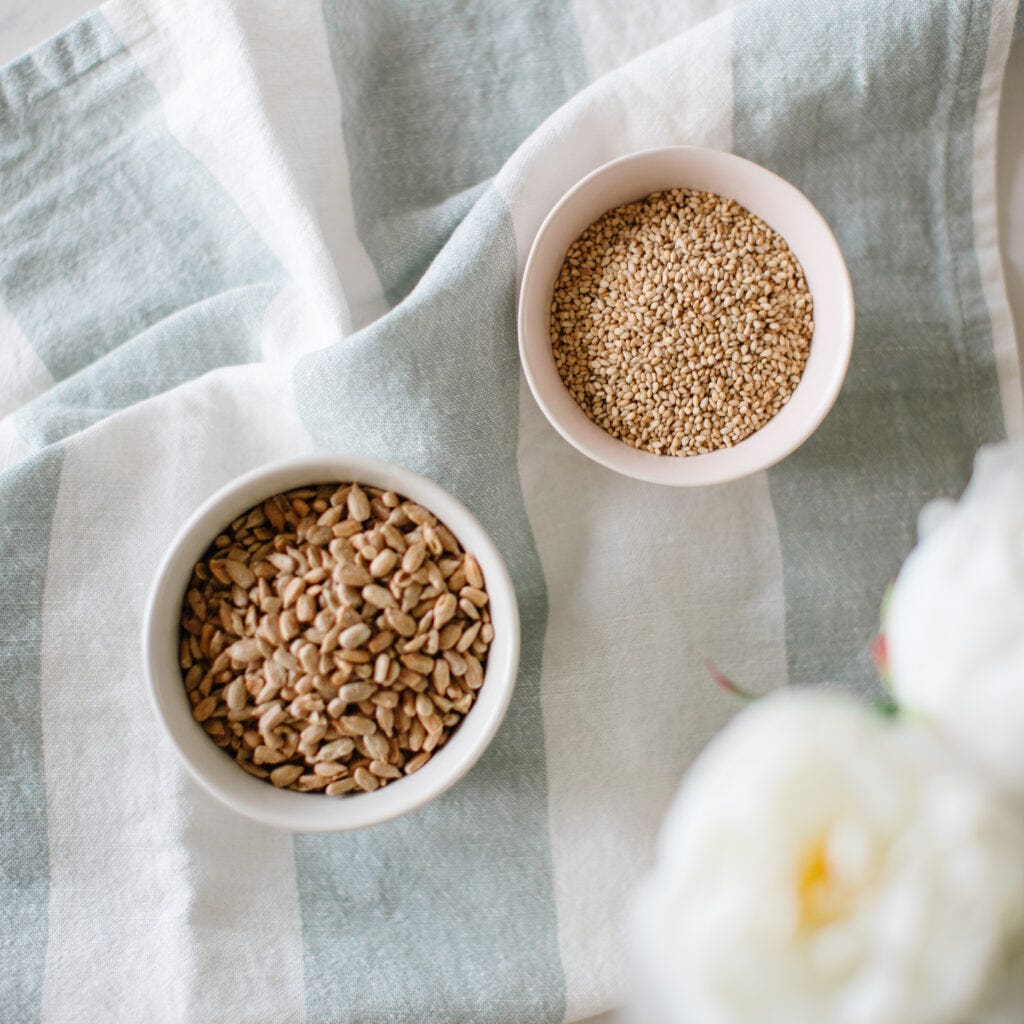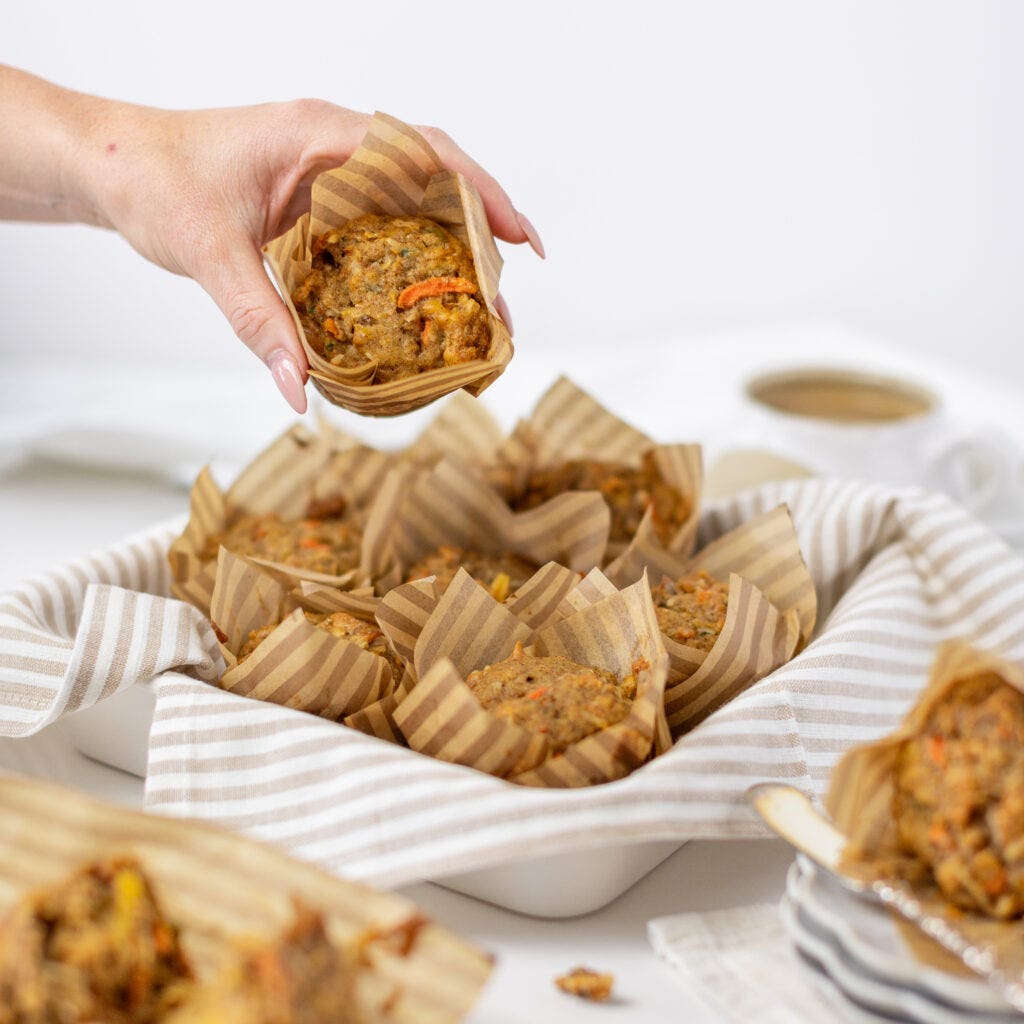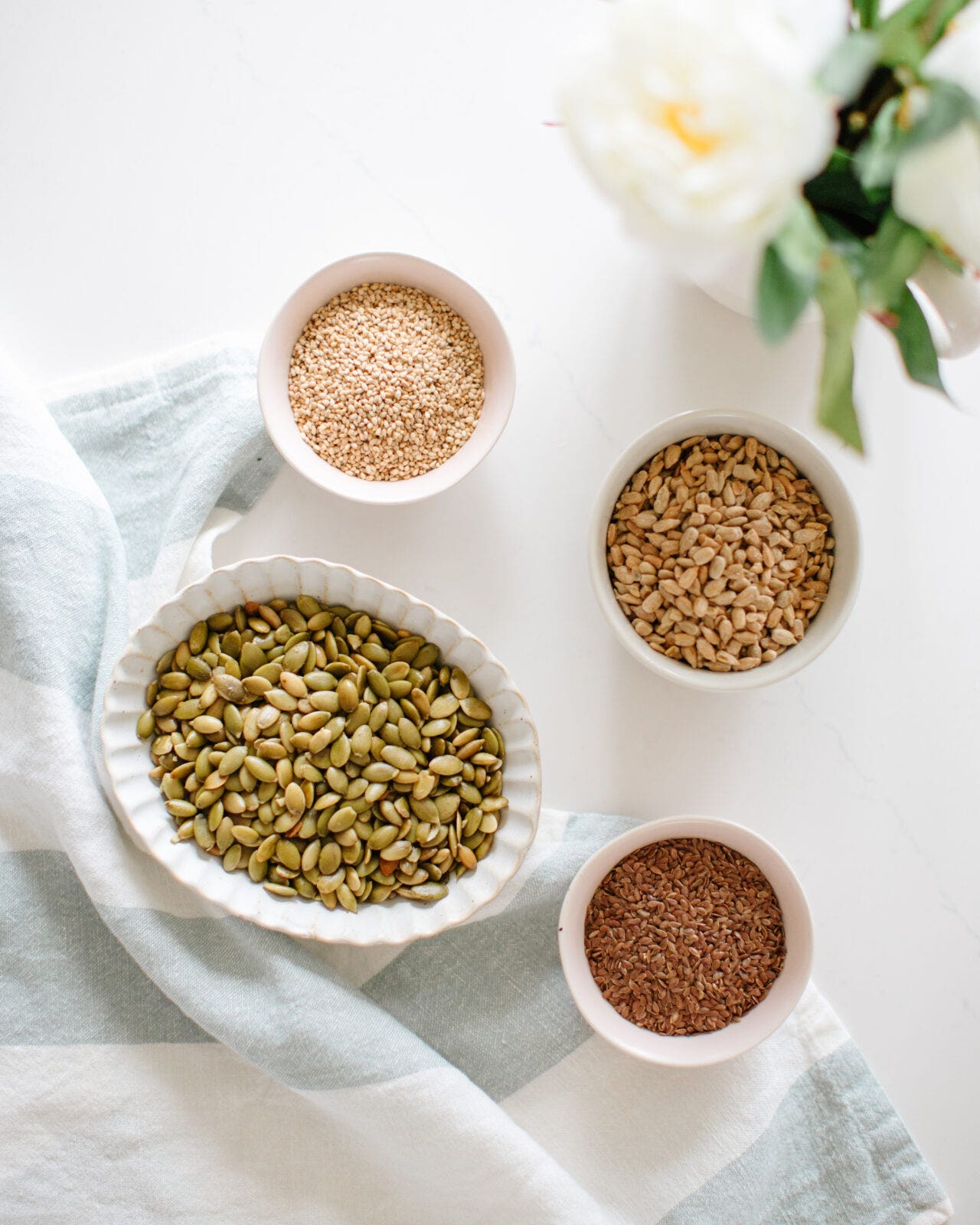Seed cycling is one of the latest trends in the health and wellness world, claiming to be the key to balancing hormones. Seeds are packed full of nutrients, and as such, a concept termed seed cycling has quickly grown in popularity due to claims that it can help balance hormones and regulate the menstrual cycle. But what does the scientific research say? Does seed cycling work? And can it balance our hormones? Well, let’s dive in and find out!

Chances are, if you are female, you have experienced some type of unwanted and pesky menstrual cycle or menopause-related symptom over the course of your life. We can thank our hormones for that! Women’s hormones are a complex, intricate, and ever-changing system that can be influenced by many different factors such as diet, exercise, sleep, stress, and our environment.
What is seed cycling?
Seed cycling is claimed to be a natural approach to balancing hormones. The concept behind seed cycling stems from the belief that consuming certain seeds in given quantities during specific phases of your menstrual cycle can provide specific nutrients to support hormone balance and reduce symptoms such as bloating, cramping, and PMS.
The concept of seed cycling is quite simple in theory and is broken down into two phases based on a typical menstrual cycle:
PHASE 1: Follicular Phase of the Menstrual Cycle (days 1-14 *day 1 is considered the first day of your period)
- Eat 1-2 tablespoons of flaxseed and 1-2 tablespoons of pumpkin seeds each day.
- Claimed to balance estrogen levels and promote progesterone production through phytoestrogens found in flaxseed lignans along with fibre, zinc, and vitamin E found in pumpkin seeds to boost reproductive health.
PHASE 2: Luteal Phase of the Menstrual Cycle (days 14-28 *day 14 is considered your date of ovulation)
- Eat 1-2 tablespoons of sunflower seeds and 1-2 tablespoons of sesame seeds each day.
- Rich in vitamin E which may help boost progesterone levels along with magnesium to help reduce bloating and other symptoms.

Why are These Seeds so Special?
So now that we know the framework behind seed cycling, you might be asking yourself, but why seeds? We all know seeds pack a punch in the nutrition department, but how exactly do they help support our hormones? According to the theory behind seed cycling, supposedly the nutrients contained in these combinations of seeds will lead to positive impacts on your menstrual cycle and hormonal balance. Some potential benefits are said to include:
- Hormonal Balance
- Regular Menstrual Cycles
- Reduced PMS symptoms
- Improved Fertility
- Alleviation of some menopausal symptoms
Is seed cycling worth the hype?
There are currently no studies that have examined the impact of seed cycling on hormone levels specifically. Therefore, most claims are based on individual experiences (not to be totally discounted as evidence). Because we lack quality scientific evidence, Individual results, experiences and potential benefits are not guaranteed and may vary from person to person.
A few potential benefits of single seeds on hormone levels have been investigated and suggested to provide potential benefits. Some of these properties include a type of phytoestrogen called lignans, found in flaxseeds and sesame seeds, which may help balance estrogen levels; zinc which can be found in pumpkin seeds and may help aid in progesterone production and; vitamin E commonly found in sunflower seeds which may boost progesterone.
While the current research remains limited in all these areas, it could be worth trying. After all, there are some solid upsides to eating more seeds, even though we don’t know that consuming these nutrients specifically from seeds translates to better outcomes compared to consuming these nutrients from other dietary sources.
Long story short, seeds are an excellent and nutritious addition to your diet! They provide fiber, omega-3 fats, protein and a wide variety of vitamins, minerals and polyphenols. However, ongoing research is necessary before any specific health claims can be made.


Take Home Message
Will seeds magically balance your hormones? Likely not, but they’re an excellent source of nutrition. While there is likely no harm in trying seed cycling, it is important to note that scientific research and evidence is limited. Should you still consume seeds such as pumpkin, flax, sunflower, and sesame seeds? Yes, of course!
While the jury is still out on whether seed cycling provides hormonal benefits, you can still get plenty of health benefits from seeds, and there are many ways to easily incorporate them into your diet! As always, for overall health, it’s important to emphasize a balanced diet that includes a variety of foods providing nutrients and energy to fuel your body. No one food will make or break your health. Period (pun intended).
Looking for Seed-Filled Recipes?
Want to add more seeds into your diet? Our Fraîche Table meal plan is packed with recipes you’re going to love including:
- Piña Colada Oat Bars
- Breakfast Power Cookies
- Hearty Grain Bowls
- Morning Glory Muffins
- Sesame Chicken Lettuce Wraps
Add these three seed-packed recipes to make ahead and keep on hand for adding seeds to dishes throughout the week!
- Seed Granola: great for yogurt parfaits or sprinkling on oatmeal or cereal.
- Nut-Free Pesto: use as a pizza sauce, spread on a sandwich or stir into pasta.
- Salad Topper: on a salad…. of course!



Disclaimer: This blog is for general information purposes only and is not intended to serve as medical advice or personalized recommendations. If you are struggling with hormone related conditions, it is important to seek individual advice and support from a registered medical or health care professional. It is always recommended to consult with a healthcare professional before making any changes.
Written by Tori Wesszer, RD and Nadia Rybalka, BSc Dietetics
References:
- Zacur, Howard A. “Hormonal changes throughout life in women.” Headache vol. 46 Suppl 2 (2006): S49-54. doi:10.1111/j.1526-4610.2006.00554.x
- Desmawati, Desmawati, and Delmi Sulastri. “Phytoestrogens and Their Health Effect.” Open access Macedonian journal of medical sciences vol. 7,3 495-499. 14 Feb. 2019, doi:10.3889/oamjms.2019.044
- Rodríguez-García, Carmen et al. “Naturally Lignan-Rich Foods: A Dietary Tool for Health Promotion?.” Molecules (Basel, Switzerland) vol. 24,5 917. 6 Mar. 2019, doi:10.3390/molecules24050917
- Phipps, W R et al. “Effect of flax seed ingestion on the menstrual cycle.” The Journal of clinical endocrinology and metabolism vol. 77,5 (1993): 1215-9. doi:10.1210/jcem.77.5.8077314
- Wu, Wen-Huey et al. “Sesame ingestion affects sex hormones, antioxidant status, and blood lipids in postmenopausal women.” The Journal of nutrition vol. 136,5 (2006): 1270-5. doi:10.1093/jn/136.5.1270
- Garner, Tyler Bruce et al. “Role of zinc in female reproduction.” Biology of reproduction vol. 104,5 (2021): 976-994. doi:10.1093/biolre/ioab023
- Mohd Mutalip, Siti Syairah et al. “Vitamin E as an Antioxidant in Female Reproductive Health.” Antioxidants (Basel, Switzerland) vol. 7,2 22. 26 Jan. 2018, doi:10.3390/antiox7020022
- Alasalvar, Cesarettin et al. “Specialty seeds: Nutrients, bioactives, bioavailability, and health benefits: A comprehensive review.” Comprehensive reviews in food science and food safety vol. 20,3 (2021): 2382-2427. doi:10.1111/1541-4337.12730

